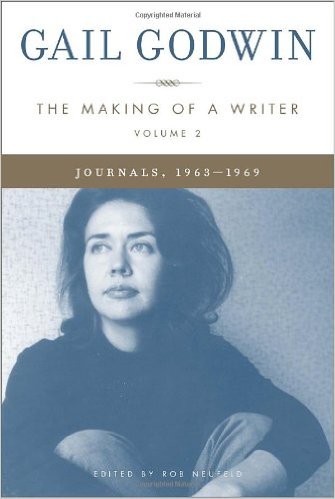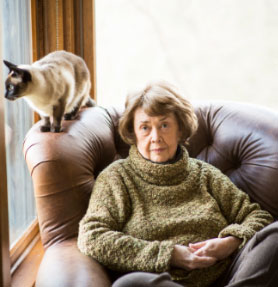Book Excerpt
 The Making of a Writer Volume 2
The Making of a Writer Volume 2
Journals, 1963-1969
Published 2011
In the summer of 1961, twenty-four-year-old Gail Godwin dispatched herself to Europe to become a writer. Having shed both a marriage and a journalism career, she hung her financial well-being on the promise of a job with a soon-to-open U.S. Travel Service office in London.
For two years, Gail negotiated foreign cultures and demanding relationships while hungrily educating herself and recording her emotional and intellectual progress. The first volume of Gail's journals (published in 2006) revealed how she'd found her voice and purpose, distinguishing herself from her influences. The second volume now shows how she built on that self-confidence to publish her first stories and novels.
Fittingly, Volume 2 opens with Gail parked at her desk in her familiar Chelsea boardinghouse, reading her previous journals. "I have only to reread them to pick out the inconsistencies and to recognize the few true aspirations that thread through page after page," she writes.
Using herself as a laboratory of introspection, and her relationships as opportunities to understand others, Gail follows the model of one of her heroes, Carl Jung, whose Memories, Dreams, Reflections recorded his inward explorations. What Gail comes up with is distinctive, and is encapsulated in the title of this journal part, "The Dramatic Self."
The dramatic self is, in one sense, the posing self, the one that is on stage in society. In another sense, it is the self that experiences the most essential dramas-meaningful interactions based on one's natural agenda. Finally, there's the dramatic self that is separate from the person and belongs in the world of literature, the one that is re-formed to sound true in stories.
Reading about Gail's adventures and misadventures shows how her literary sphere of existence was as prominent as her social one. While her coworkers, fellow tenants, and boyfriends provide community, they stand in opposition to her aloneness and imagination.
Through it all, the psychology, politics, and nuances of male-female relations preoccupy Gail. Although any subject would do for a writer striving to develop her art, gender relations were particularly pertinent at the time. Gail was in the thick of the matter. "I want to . . . exploit, define, name, place this ever-shifting contest between men and women," she wrote on August 13.
The dilemma for Gail was how to have her enlightened perspective correspond to happiness in personal relationships, in which egos often foiled idealism. On August 13, Gail wrote that she wanted to convey, among other things, "the feeling you get while living through a happy
moment-when you refer back to the past when you had anticipated this moment, and when you look toward the future when you won't have it any longer." She wanted anticipation and reflection to be part of the moment-yearning, experience, and loss, all one.
july 23, 1963
More and more I believe in these journals. They are my "thinking out" grounds where I can record and measure my deviations. I have only to reread them to pick out the inconsistencies and to recognize the few true aspirations that thread through page after page. It is difficult to label oneself "faithful" when, upon rereading two years' worth of self-reflection, one finds agonizings over B., Niels, Antonio, James, Jim Jensen, Henry, and Gordon! On the credit side, I know for certain that this urge to understand/write is no fly-by-night whim. I know how Gordon feels when people say: "Oh, Bisley! Yes, I'm a pretty good marksman myself. I'll have to come out with you one Sunday and shoot a few bull's-eyes!"1 I feel the same impatience with people who say: "Oh, yes, writing. I'd like to write if I only had the time. My life would make one hell of a story."
Pat Farmer wrote her après-honeymoon letter to Doreen2 "and everybody" from Mexico City. She obligingly described the wedding-sending clippings-and the honeymoon, showing a color photo of herself among Mayan ruins. Mr. Miller couldn't wait to read the letter. He always liked her. "Well! Is that from you-know-who? She finally made it. See, there's hope for you girls yet!" Pat wrote about how she and Pepe went skin diving and horseback riding. Then she put in the paragraph about how happy they were, adding that it was somewhat of an adjustment, etc., etc., but that it was surprising how much you could get out of a situation where you worked very hard to make the other person happy, etc., etc. She then mentioned that she was trying to get a job with USTS-Mexico. Doreen read the letter and then expounded upon how ecstatic Pat must be.
After Doreen left, Dorothea3 observed: "I think it's interesting that she wants to work again." Then we both exchanged knowing looks, and she said: "My God, by the time we're thirty-five we're going to be goddam sages." So the balance is restored in the office, or should I simply say the dialectic has swung? Dorothea admits taking refuge from the realization of a bad marriage through hard labor. "By the time I've prepared a meal and cleaned the house and washed up and ironed, I don't have time to think about myself. I'm too tired. Of course I realize that there might be a lifetime of this."
After spending the better part of the past three days with Gordon on the shooting range at Bisley, sailing in Henley,4 drinking in various pubs, and then last night at the horse show, I have come to the conclusion that I still love him, but in a modified way. I think I will value him for the efforts I am making to win him! We passed two people in the White City Stadium5 and he said: "Were those men or women?" I said, sort of off the cuff: "Why, the one that looks like a man is a woman; the one that looks like a woman is a man." "What makes you say that?" he asked. "Well, you should always know that things are the opposite of what they appear." (Canting unforgivably!) "Smart girl." Did he really think so? I also learned about his experiences on the convoy going to the U.S. during the war. He said he even made himself a survival kit. There was something in this story about the calm, almost detached way he went about things. I saw the war from a little boy's eyes. And the way he'd watch the laggers-behind get sunk by the German U-boats. All this-the years in Canada and Trinidad- shaped him, too. But I think he was born with this dogged, plodding, stubborn way of doing things.
But, today in Gill's bookstore, several incidents combined and made me see the kind of man that is possible: I saw a book I wanted, [the latest volume of] Simone de Beauvoir's autobiography,6 about her writing and her life with Jean-Paul Sartre. And I thought, Wouldn't it be nice if someone knew me so well they would know this is the book I want and bring it home? I know that I am capable of such consideration toward someone else. Then I thought of the possibility of, say, Gordon bringing me that book. It was impossible. (1) He doesn't go into bookstores. (2) He doesn't know who Simone de Beauvoir is. (3) He doesn't know what I read, in spite of the fact he's always inspecting book titles. Somehow I remember Doug7 and me in the bookstore in Detroit one evening while we were killing time before seeing Spartacus. I was in heaven-thousands and thousands of glossy new books, two floors of them, and some strange new symphony playing. I asked Doug if he would buy me Jacob's Room & The Waves by Virginia Woolf, a $1.75 paperback, and he grudgingly assented. The music grew on me. I went up to the man at the desk and asked him what it was. "Oh, that's Beethoven's Pastoral, I think," he said. And when we were back in Florida I bought it and began playing it more and more to assert my aesthetic independence from Doug.
july 27-28 After midnight
I read an article by Marya Mannes8 today. I'm one of those women whose composition is balanced peculiarly between woman-ness and creativity.
july 30
Dorothea: "I think I attribute that sick feeling I have every morning to the leftover anxiety from unremembered dreams."
august 7
It is with immense relief that I close the door to my room on the top floor of a Chelsea house,9 settle into a comfortable bed, and listen to the sounds of the night, the muffled hum of traffic down by the embankment, the toned-down rock and roll of a German radio program (bringing back the night in the East Berlin police station, fall 1961). 10 True, time is the villain and we are trapped in him. True, love is sometimes not returned. True, friends are sometimes false. But to be aware of this-all of it-and still want to go on living, that is the triumph. It is the reward. Go on, French voices; and there is Rachmaninoff in the background. Thomas Wolfe called loneliness a brother and I think he was right. And I have not read Rimbaud or Baudelaire nor have I even begun to put down what I will put down on paper.
But first, the bad dream and then the realizations that came unexpectedly out of a weekend that, from all outward signs and from everybody else's viewpoint, was pleasant, restful, and full of good fun.
This morning, the alarm awoke me at eight. Then I dozed and dreamed that I was standing in some sort of a gymnasium watching some performance or other. Gordon came in with John11 and Sally Milner, the very attractive, upper-class English girl who works at USTS. He said to me, "Oh, hello, nice to see you," in that cordial way he has. Then he transferred his entire attention to the performance on the stage. I kept watching him for some assurance that we had meant something to each other. Finally I asked him, "Gordon, aren't we going camping together?" And he answered very surely, very unembarassedly, with the same detachment that he used the day Bobbie12 and I turned up at the same time in his flat when he was sick, "No, I'm afraid I can't. I'm taking Sally." Then I turned to Sally and said, "But how? You've just come back from three weeks' vacation." She replied, "Yes, but you see, in this life, some people get three weeks' vacation and some don't get any at all. And usually the people who get three get offered more." So I took my sweater and handbag and said, "Well, in that case, I'll be leaving." I walked out of the gymnasium, feeling Gordon's eyes on me, thinking: He'll be sorry. Then I got outside and thought: It hurts as much as it possibly can-ever. Then I turned around and went back in and caused a scene. Gordon remained smiling and unperturbed. I said: "I'm just in the same category with Bobbie." He answered: "That's okay. I like having her around once a week or so."
I awoke feeling beaten. I lay at the foot of my bed, saying "Oh, no!" Then I got up and went to the washbasin to wash away any visible traces of the ordeal I'd just been through. I looked surprisingly normal to myself in the mirror. I thought: It cannot get any worse. Then, and this is very important, I was overcome by an almost beautiful kind of relief: I recognized my plight and accepted it, knowing that I was going to live it out-like you wear out a pair of shoes or write out a journal. There was a basic sense of continuation of life, a celebration of change.
august 8 Thursday
I just thought: If I wanted to get rid of Gordon, I would simply hand over my stack of journals from 1961 onward. By the time he read through the first one, he would be shocked. I cannot forget Gordon's statement re Ingmar Bergman: "I don't understand mad people and I don't want to."
With so much sunshine in my memory, how could I have bet on nonsense?
-albert camus, Notebooks, 1935-1942
Sometimes small things, past happenings, flash across my memory and I am astonished by who I am and what I have done. The dangerous thing is to judge myself by the standards of other people.
august 9
Just like old times again-me, myself, and I-with diversions of catching 19s and 22s13 to work; Robin and Henry came for lunch to dredge up old times, which are better left undredged. Next week: a press party for the governor of Florida.14 Fall is coming and again there are many possibilities.
I don't know whether I am becoming eccentric or losing my mind or whether I really am right. Robin15 came to dinner at my invitation and expense, spent two hours talking to the Portuguese woman in a variety of French-Spanish-English. I could not join in, but sat and smiled for a few hours. At 10:30, I went out for a walk. When I came back, Robin had been looking for me, and we went to a pub where there were two old friends of his who just got married. They had much to talk over. At intervals, Robin would say: "Gail is bored. I've behaved badly tonight. She gave me a meal and then I spent two hours talking to somebody else." When we left the pub, Robin said: "Why can't you make the effort to talk to people, etc." He was incensed. I tried to explain that he hadn't introduced me. He said he had. We parted none the unhappier for parting.
august 11
I have often wondered how big an indulgence this journal is-
especially when I am recording the comings and goings of men. Gianni Schicchi16 is playing . . . I have a Madeira hangover. Last night I sorted out my writing and did a little bit of revision.
to barbara's in Hampstead for coffee and pancakes. Now, there's an interesting girl. Very selective, good taste, fighting her South African origins a little too fiercely. We listened to Negro spirituals, drank coffee, looked at her brass rubbings, and discussed things one ought to discuss. That's the point about Barbara. One feels one is doing so many worthy things. I am sure the man who marries her will do so because he thinks she is the type of girl one ought to marry.17
august 13
One would have a great advantage over his dark devils if he could predict when which of them were due to turn up. I think I have a special cycle-of course, Hilda18 would chalk it up to my astrological chart. At certain times, I am obsessed with the passing of time, wrinkles, aging, becoming unattractive to men. It is at these times that I tend to be possessive, shortsighted, a real "leaner." At other times, time is relatively unimportant. Just living, hearing airplane sounds, going out, chatting with the Wests, etc., is enough. And then there are periods like tonight-INTERIM periods, mid-swing between cycles. I am not terribly upset or intense about anything. People seem fairly remote. I have written well today. I wrote last night-suddenly I am not tired after dinner. I bought a £3 tome on Thomas Wolfe, which I could not afford. Tonight I am going to enjoy my dinner, do my exercises, write the final paragraph of "Bay Bridge,"19 maybe set my hair, and read The Window of Memory,20 which is an academic study of Wolfe and how he wrote.
Random House | Hardcover| 336 pages





